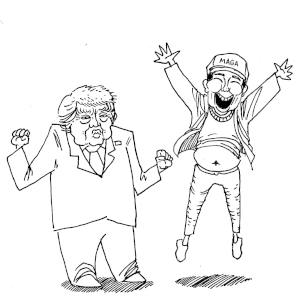The Apotheosis of Donald Trump
It might seem curious that Trump spent a valuable Sunday of campaign time before the election at a rally the middle of a city and a state that he has no chance of winning. MAGA Republicanism has never been about building out a broad coalition so much solidifying a hard kernel of passionate anger and devotion. But in an election this close, which will likely be decided by hair-thin margins in a handful of states, a foray into New York City might seem like a waste of a precious time. The Trump campaign has in fact spent comparatively little time or money persuading undecided voters to support him or prevailing on hesitant Republicans to back the party’s candidate, let alone making sure that voters to get to the polls. Rather, they have invited the MAGA faithful into an alternate world where Trump has already won, and that it is only the deceitful machinations of the Democratic Party that stand between him and the Oval Office.

Artist: Pedro Camargo
In some ways the sensory power of patriots looking out from their seats seeing themselves in each other across the enormous venue bathed in soft red, white, and blue lighting, losing the sound of their own voices in the collective roar in “The World’s Most Famous Arena” told the story of their hero’s challenges and certain triumph as much as any words could. A number of commentators have drawn a parallel to the infamous American Nazi Party rally held there in 1939, or to George Wallace’s third-party presidential campaign event on the eve of the 1968 election. But we could also look back to 1874, when the venue was first leased to P.T. Barnum, who built a career promoting hoaxes and providing circus entertainment. Or we could look forward to 1985 when the Garden was host to the first Wrestlemania, a staged celebrity combat event sold not just on the suspension of disbelief, but the thrilling pleasure of make-believe.
Thrilling make-believe stories are the very stuff of Trumpism. And this seems to be exactly what the campaign is betting on should their candidate come up short in the election. It has already long laid the groundwork for discrediting election results both in the courts and on the streets.
The story of Trump as an outsider who prevails against the forces of corruption arrayed against him has long been part of his political persona. What better way to make this point than to return to the city where he has been indicted, convicted, sued, silenced, and fined. After all, as it says right there in the $80 Holy Bibles Trump he is hawking, prophets are never honored in their own hometowns. And to be sure, many people at the rally itself were not denizens of New York City anyway. A great number of red-hatted devotees who had come from New Jersey, Long Island and other parts of the region. Organized groups were bussed in or flew from as far away as Los Angeles. Nevertheless, they cheered wildly when As Don Jr strode to the podium to the heavy guitar strains of Ted Nugent’s Stranglehold to yell “The King of New York is back to reclaim the city that he built!”
Along the racist and misogynist jokes, lurid descriptions of immigrant violence and murder, and literal castration complex driven by fears of a dark trans agenda; the main speakers of the day were there to attest to the mythic trials of their hero and his miraculous overcoming at every turn. Rudy Giuliani came to the stage early in the day, his visage now a permanent bulldog’s scowl, and shouted that Trump “answered the question of who can lead us without a doubt out of this morass of socialism, fascism, and communism,” because “on July 13th of this year, after he came this close to death . . . within seconds he got up. Did he run away? Did he hide? Did he crawl? Did he appease the people who were attacking him?” “No!” screamed the audience in response to each rhetorical query. “He stood up and he thought about you, and me. And then when we saw him say ‘Fight!’” And thousands of voices in the arena joined him in the chant, “Fight! Fight! Fight! Fight!’ That’s the man to lead us back to the America we love!”
Later in the day Eric Trump took up the theme, albeit expanding its dynastic reach. “This isn’t politics. This is a family,” he said. “This is so much more than a political movement. This is the greatest family in the world.” Then, like Giuliani, he recounted the familiar legend: “They tried to impeach him twice. They went after his Supreme Court nominees. They threw him off of Facebook. They threw him off of Twitter. They threw him off of Instagram. They tried to take away his First Amendment right . . . They weaponized every DA and every AG in this country to take down my father . . . they tried to subdue the vote of literally hundreds of millions of Americans who absolutely adore the guy, he said. “And then somebody tried to kill him. And despite that he stands up every single time and says (here the crowd joins in again) ‘Fight! Fight! Fight!” Finally, JD Vance brought his own speech to a close the same way he has been wrapping it up on the campaign trail in recent weeks : “When they couldn’t beat him, they tried to bankrupt him. When that didn’t work they tried to impeach him. When that didn’t work they tried to put him in federal prison and when that didn’t work they even tried to kill him. But as sure as the American flag still waves, Donald Trump still stands. Ready to fight! Ready to win! And ready to make America great again!”
Since Trump’s former chief of staff General John Kelly finally agreed to tell the New York Times on record that his former boss met the definition of a fascist, there has been lively public discussion about how to describe the candidate. Scholars have long debated the issue, with some insisting that Trump is better understood as an authoritarian populist. The language of outsiders and elites conspiring to subvert the will of the nation is indeed classic populist rhetoric. And the recounting of attacks on the leader dramatically affirms his credibility of the people’s representative. In Trump’s words, emblazoned across the campaign webpage, “THEY’RE NOT AFTER ME, THEY’RE AFTER YOU…I’M JUST STANDING IN THE WAY!”
But particularly since he became the Martyr of Butler County, Trump has undergone a kind of apotheosis. He is now described in almost superhuman terms as indestructible, as always rising. The qualities projected onto Trump are politically formidable precisely because they enact the story of national renewal captured by the phrase “Make America Great Again.” The air of inevitable triumph, of Trumpist victory as a sacred Telos, moves us somewhere closer to fascism. The image of Trump rising from the floor of the stage after his shooting, blood-spattered, fist clenched, urging his people on to battle is burned into the collective psyche of his followers. He isn’t Lincoln, nor JFK. He’s far better. Those losers were down for the count. You didn’t see anybody in the Ford Theater or in Dealey Plaza getting to chant “Fight! Fight! Fight!” along with their resurrected messiah. For his people, Trump is both the essence of national vitality, and a perfect instrument of God’s will. Indeed, it didn’t matter that Trump spent 70 minutes meandering through his speech, seeming to make up stories on the fly as he went along (for example, FEMA didn’t have money for hurricane relief in North Carolina because they spent all its money on “big beautiful airplanes” to fly migrants into the U.S.). He has moved from candidate to pure myth and symbol. This phenomenon already carries a strong whiff of fascism, even before we get to direct reference to race or gender.
And as it happens though, the campaign’s depictions of the expected Democratic malfeasance at the polls turn precisely on direct reference to race and gender. In MAGA depictions, Harris as a Black woman could not possibly be a candidate with popular backing in the electorate. She is merely a tool to be used by nefarious forces. The vile businessman Grant Cardone put it this way: “Her and her pimp handlers will destroy the country.” Tucker Carlson went further though, using eugenic racism to argue for the utter impossibility of a Harris victory: “Ten days from now it’s going to be pretty tough for them to look in the eye of America with a straight face and say . . . ‘You know what? Kamala Harris got 85 million votes because she’s just so impressive. As the first Samoan-Malaysian, low IQ former California prosecutor ever to be elected President, it was just a groundswell of popular support!’ At this stage of the game after nine years of listening to their lies and finding every single one of them totally false, no it’s not safe and effective . . . it’s very hard for me to believe the rest of us are going to say, ‘You know what, Joe Scarborough, you’re right, she won fair and square because she’s just so impressive!’ I don’t think so. And for me that’s liberation. It’s the freedom to say what’s obviously true as a free man and not a slave.” In Tucker Carlson’s funhouse of Trumpism at Madison Square Garden, the grotesque mirrored reflections turned authoritarianism into liberation, and slavery into freedom.
Should Harris eke out a victory the inevitable weeks of election challenges in the courts and in the streets will likely come to nothing, although of course there is no guarantee. Ultimately though, all of it is evidence that the instruments of liberal democracy are not built to withstand the wide-spread growth of a 21st century fascist movement in this country both as a social and political formation. Opposition to Trumpism, which is to say antifascism, will ultimately have to confront this phenomenon at all levels with a social movement committed to confronting forms of both public and private tyranny that have been hollowing out whatever aspects of political and social equality remain after a half century of neoliberalism. It will have to generate alternatives that look nothing like Kamala Harris’s commitments to U.S. global military hegemony, to Wall Street, to the fossil fuel industry, and to genocidal regimes abroad. It must, in other words, be committed to democracy, egalitarianism, and to a survivable future. Otherwise, we can expect to see more Americans seek out comfort in the nationalist fantasies of MAGA in hopes of being the punishers, not the punished. And we can expect many more to feel ambivalent, if not to say enervated, by the prospect of having to be conscripted four years from now into trying once again to snatch an increasingly irrelevant liberal democracy from the jaws of the fascists.

